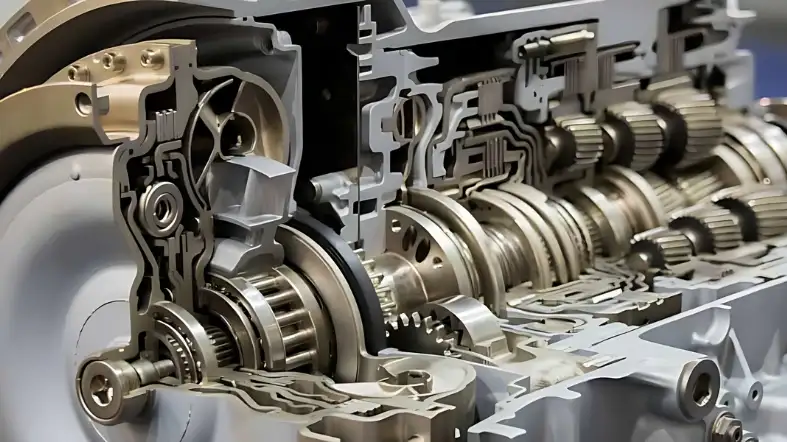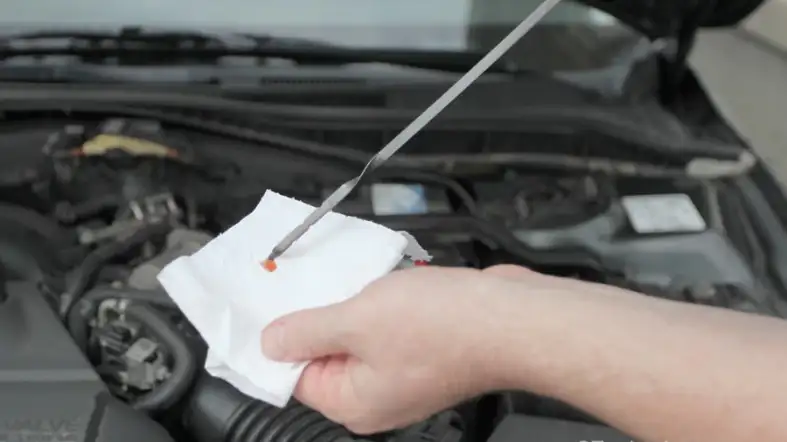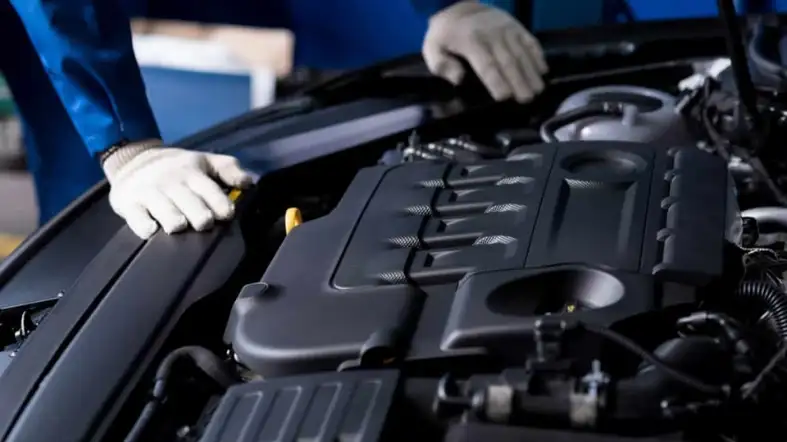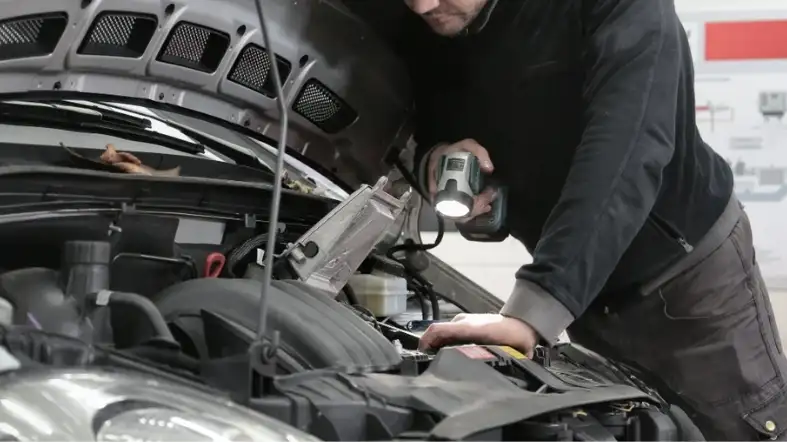Are you hearing a grinding or rattling noise when you let off the gas pedal? If so, you’re not alone.
This common issue can be quite frustrating and concerning for car owners, especially if they don’t know what’s causing it.
In this blog post, we’ll explore some possible causes of this noise and provide some tips on how to address the issue.

Grinding, Rattling Noise When I Let Off The Gas
A grinding or rattling noise when you let off the gas could indicate several issues with your vehicle. Some potential causes of this noise include:
Worn-out wheel bearings:
The grinding or rattling noise can be a sign of worn-out wheel bearings.
When the bearings become worn, they can cause a grinding or rattling noise when you let off the gas pedal.
Faulty transmission:
If the grinding noise is more pronounced when shifting gears, it may be due to a faulty transmission.
The transmission may not be shifting properly, or there may be damaged gears that are causing the noise.
Worn-out brake pads:
If the noise occurs when you are slowing down or coming to a stop, it could be due to worn-out brake pads.
The grinding noise is caused by the metal-on-metal contact between the brake pad and the rotor.
Damaged or worn-out suspension components:
A grinding or rattling noise when letting off the gas can also be caused by damaged or worn-out suspension components, such as control arms or bushings.
Misaligned wheels:
If the noise occurs while driving, it could be due to misaligned wheels. Misaligned wheels can cause uneven tire wear, which can lead to a grinding or rattling noise.
Low or contaminated transmission fluid:

Low or contaminated transmission fluid can cause the transmission to make a grinding or rattling noise when shifting gears.
Faulty engine mounts:
If the engine mounts are worn or damaged, it can cause the engine to vibrate excessively, which can lead to a grinding or rattling noise.
Loose or damaged drive belts:
Loose or damaged drive belts can cause a grinding or rattling noise when letting off the gas.
This noise is caused by the belt slipping or rubbing against other components.
Clogged or damaged catalytic converter:
If the catalytic converter is clogged or damaged, it can cause a rattling noise when letting off the gas.
This noise is caused by the loose or broken internal components of the converter.
Worn-out universal joints:
If the noise occurs while driving and is more pronounced during acceleration, it could be due to worn-out universal joints.
These joints allow the driveshaft to flex and rotate, and when they wear out, they can cause a grinding or rattling noise.
Faulty wheel hub assembly:
A faulty wheel hub assembly can cause a grinding or rattling noise when letting off the gas.
This noise is caused by the damaged or worn-out components in the hub assembly.
Worn-out clutch:
If the noise is more pronounced when shifting gears in a manual transmission vehicle, it could be due to a worn-out clutch. This noise is caused by the clutch plate slipping or grinding against the flywheel.
Dirty or clogged air filter:
If the air filter is dirty or clogged, it can cause the engine to work harder and produce a grinding or rattling noise.
Faulty power steering pump:
A faulty power steering pump can cause a grinding or rattling noise when turning the steering wheel. This noise is caused by the damaged or worn-out components in the pump.
Loose or damaged engine components:
If the noise is coming from the engine compartment, it could be due to loose or damaged components such as pulleys, belts, or hoses.
Overheating engine:
If the engine is overheating, it can cause the metal components to expand and contract, which can lead to a grinding or rattling noise.
Dirty or contaminated fuel:
Dirty or contaminated fuel can cause the engine to run rough and produce a grinding or rattling noise.
Faulty alternator:
A faulty alternator can cause a grinding or rattling noise when letting off the gas. The damaged or worn-out components in the alternator cause this noise.
Faulty water pump:
A faulty water pump can cause a grinding or rattling noise when letting off the gas. This noise is caused by the damaged or worn-out components in the pump.
How to identify the source of the noise and determine if it’s serious?

Perform a noise source identification (NSI) test:
Noise source identification (NSI) tests can help diagnose, visualize, understand, and solve noise issues.
By tracing noise back to specific components, engineers can target their troubleshooting efforts to the root of the problem.
NSI is an essential tool to reduce noise and optimize noise that cannot be eliminated.
Measure the noise level and compare it to acceptable standards:
Noise pollution is any unwanted or disturbing sound that affects the health and well-being of humans and other organisms.
It is measured in decibels (dB). Several organizations have set acceptable noise levels for different settings, such as residential areas, hospitals, and schools.
Measuring and comparing the noise level to these standards can help determine whether the noise is serious.
Common Repairs To Fix A Grinding And Rattling Noise When Letting Off The Gas
Here are some possible fixes for the grinding and rattling noise when letting off the gas:
Fixing Transmission Issues:
If the noise is caused by transmission problems, such as worn-out bearings, a failing torque converter, or a damaged clutch, fixing the transmission is the solution.
A mechanic can diagnose and repair the issue, which may involve rebuilding or replacing the transmission
Replacing Worn-out Drive Shaft:
A loose or worn-out driveshaft can also cause a grinding or rattling noise when you release the gas pedal.
Replacing the driveshaft with a new one can solve the problem
Fixing Mount Wear and Tear:
Mounts are the components that hold the engine and transmission in place.
Over time, they can wear out, causing the engine or transmission to move excessively and make noise. Replacing the worn-out mounts can reduce or eliminate the noise.
Repairing Suspension Problems:
If the noise is caused by suspension problems, such as worn-out bushings or ball joints, repairing or replacing the damaged parts can solve the issue.
Adjusting Timing Chain:
Adjusting or replacing the chain can fix the issue if the grinding or rattling noise is caused by a loose or worn-out timing chain.
Fixing Wheel Bearings:
Worn-out wheel bearings can cause a grinding noise when you release the gas pedal. Replacing the damaged bearings with new ones can solve the problem.
How To Prevent A Grinding And Rattling Noise From Happening In The First Place?

You can take several steps to prevent grinding and rattling noises from occurring in the first place. Here are some suggestions:
Proper maintenance and lubrication:
Regular maintenance and lubrication of mechanical parts can prevent metal-to-metal contact and reduce friction, which in turn can minimize noise.
Proper installation:
Ensure that all components are installed properly, according to manufacturer guidelines and specifications.
Poorly installed parts can lead to unnecessary friction and vibration, resulting in noise.
Proper alignment:
Properly aligning moving parts can also help minimize noise. Misalignment can cause parts to rub against each other and create noise.
Use of vibration isolation mounts or pads:
Using vibration isolation mounts or pads can help reduce noise caused by vibrations.
These mounts or pads can be installed between the equipment and its foundation or between two pieces of equipment to help absorb and dampen vibrations.
Use of sound barriers:
Using sound barriers such as acoustic curtains or barriers can help block noise from spreading to other areas of the facility.
These barriers can be particularly useful in industrial settings where loud machinery is present.
Proper selection of equipment:
When selecting new equipment, consider noise levels as a factor in the decision-making process.
Choose equipment that is designed to minimize noise and ensure that it meets all relevant noise regulations and standards.
Regular inspection and monitoring:
Regular inspection and monitoring of equipment can help identify and address potential noise issues before they become serious.
Frequently Asked Question
Q. What Could Be Causing A Grinding And Rattling Noise When I Let Off The Gas?
A: The most common causes are worn or damaged bearings, damaged drive axles, damaged CV joints, or worn-out universal joints.
Q. Is It Safe To Drive My Car If It’s Making A Grinding And Rattling Noise?
A: It is not recommended to drive your car if it’s making unusual noises.
It’s better to get it inspected by a mechanic as soon as possible to avoid further damage.
Q. Can A Damaged Transmission Cause A Grinding And Rattling Noise When I Let Off The Gas?
A: A damaged transmission can cause a grinding and rattling noise.
You should have a mechanic check your transmission fluid and inspect the transmission for any damage.
Q. How Much Will Repairing A Grinding And Rattling Noise Cost When I Let Off The Gas?
A: The repair cost depends on the noise’s underlying cause.
You should get a diagnostic test from a mechanic to determine the cause and the estimated cost of the repair.
Q. How Can I Prevent My Car From Making A Grinding And Rattling Noise?
A: Regular maintenance and inspections can prevent the occurrence of grinding and rattling noise.
You should get your car serviced regularly and replace any worn-out parts promptly.
Q. Can A Loose Exhaust System Cause A Grinding And Rattling Noise?
A: Yes, a loose exhaust system can cause a grinding and rattling noise.
You should check your exhaust system for any loose or damaged parts and replace them if necessary.
Q. Should I Attempt To Repair The Grinding And Rattling Noise Myself?
A: It’s not recommended to attempt any repairs yourself if you’re not experienced with car repairs.
It’s better to leave it to a professional mechanic to avoid further damage to your car.
Conclusion:
Don’t ignore grinding or rattling noises when you let off the gas pedal. While they may seem minor at first, they could be a sign of a larger problem with your car.
By identifying the source of the noise and taking action to address it, you can ensure that your car remains safe and reliable for years to come.
So if you’re experiencing this issue, don’t hesitate to seek the help of a qualified mechanic to get to the bottom of it.
